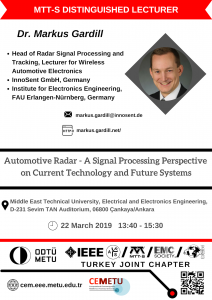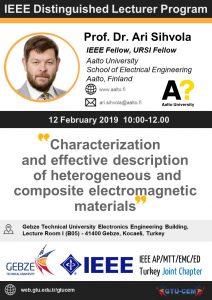27 December 2019 (12:40): IEEE AP/MTT/EMC/ED Turkey Seminar Series (S.64)
Speaker: Asst. Prof. Cem Tekin, Bilkent University
Topic: “Exploration and Exploitation in Complex Domains: Learning with Multiple Objectives and Contexts”
Location: Middle East Technical University, Ankara, Turkey
Abstract: Delivering personalized medicine for treatment of complex diseases, discovering and recommending interesting articles for a particular user from a huge set of documents and optimising hyper-parameters of deep learning architectures given a particular dataset all require context-driven learning of optimal decisions over time. Efficient online learning in these domains is a formidable task at least for two reasons. The first is that the contexts often arrive from a variety of sources and have diverse features, so that integrating what is learned is subject to the curse of dimensionality. The second is that existence of multiple and possibly conflicting objectives often makes it impossible to simultaneously optimize each objective. In this talk, I will present recent pieces of multi-objective and contextual bandit models addressing these challenges. In particular, I will explain how to tradeoff conflicting objectives using notions of lexicographic and Pareto optimality in an online learning setting and context-dependent multi-dimensional rewards. I will discuss how the well-known notion of regret can be extended to capture a rich set of multi-dimensional performance metrics, and present learning algorithms with sublinear regret guarantees.
Bio: Cem Tekin is an Assistant Professor in the Department of Electrical and Electronics Engineering, Bilkent University, Ankara, Turkey. He received PhD in Electrical Engineering: Systems, MS in Mathematics and MSE in Electrical Engineering: Systems, from the University of Michigan in 2013, 2011 and 2010, respectively. He received BS degree in Electrical and Electronics Engineering from Middle East Technical University, Ankara, Turkey in 2008. From 2013 to 2015, he was a postdoctoral scholar in Electrical Engineering Department, UCLA. Cem has authored or coauthored over 50 research papers, 5 book chapters and a research monograph. He received the Fred W. Ellersick Award for the best paper in MILCOM 2009 and the Science Academy Association of Turkey Distinguished Young Scientist (BAGEP) Award and Parlar Foundation Young Investigator Award in 2019. His research interests include bandit problems, machine learning for personalized medicine, multi-agent systems, stream mining, influence maximization and cognitive communications.
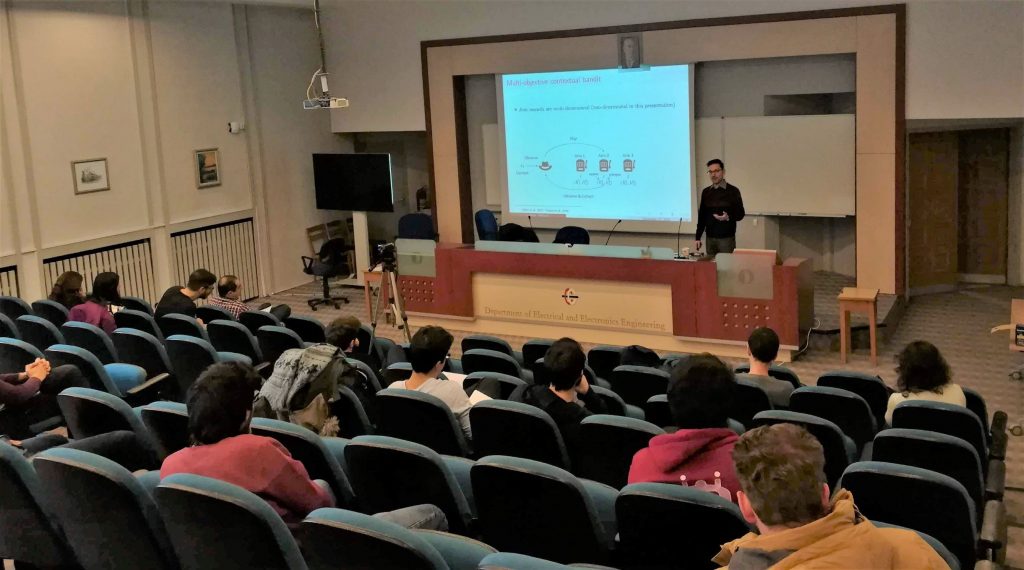
vTools Link: https://events.vtools.ieee.org/m/217593
—
20 December 2019 (12:40): IEEE AP/MTT/EMC/ED Turkey Seminar Series (S.63)
Speaker: Dr. Engin Tola, Aurvis R&D
Topic: “The Design and Development of a Self Calibrating Star Tracker System”
Location: Middle East Technical University, Ankara, Turkey
Abstract: A Star tracker is an electro-optical celestial referencing device that recognizes star patterns, such as constellations, and detects its orientation in real-time to a high degree of accuracy. Satellites in orbit today make use of at least one star tracker and they are also employed in Earth and space bound telescopes, ballistic missiles, tanks and night navigating ships. In this talk, I’ll be presenting the first national star tracker system developed by the Tubitak Space Research Center and myself for the target Turksat 6A and IMECE satellite platforms. The star tracker device has two main operating modes: Lost-In-Space Mode, where the device cold-starts at an unknown orientation and tries to orient itself in some number of seconds and the Tracking Mode, where the star tracker updates its orientation from a known initial orientation in real-time (>10Hz) using the incoming video stream. Additionally, star tracker also needs to be able to operate in harsh environmental factors of space like high temperature gradients, intense vibrations during orbital launch and constant radiation. These environmental factors result in shifts and decays in the calibration of the hardware which need to be compensated for in software. I’ll be presenting the design and development of the algorithms used in the star tracker in order to ensure the required speed and accuracy targets throughout its operation lifetime.
Bio: Engin Tola received his BS and MS degrees in Electrical and Electronics Engineering from the Middle East Technical University in 2003 and 2005 respectively with Signal Processing as a sub-specialty. After that he completed his PhD studies in Computer Vision from École Polytechnique Fédérale de Lausanne, Switzerland in 2010. He then founded Aurvis R&D – a computer vision and machine learning research and development company in Ankara. He is primarily interested in 3d geometrical scene understanding, reconstruction, localization and exploration problems in real-time and offline camera systems for land-based or flying robotic platforms. During his 10 years in the industry, he developed algorithms and products for companies like Autodesk, Dronedeploy and Tubitak Space Research Center. He is also a co-founder of Argutek – a mobile augmented reality focused company and Docu.ai – a San Francisco based AI-powered data extraction company.
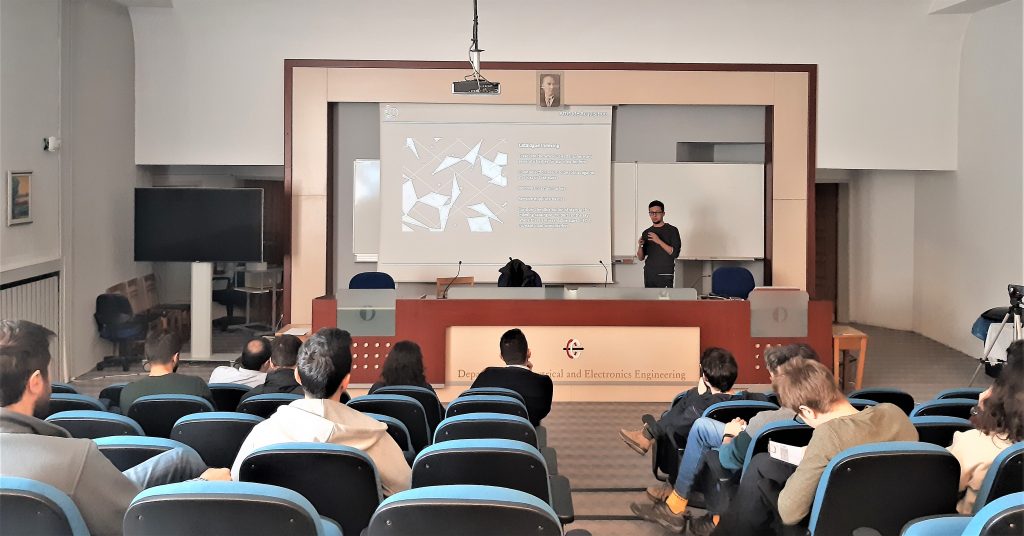
vTools Link: https://events.vtools.ieee.org/m/215247
—
13 December 2019 (19:30): IEEE AP/MTT/EMC/ED Turkey Administrative Committee Meeting
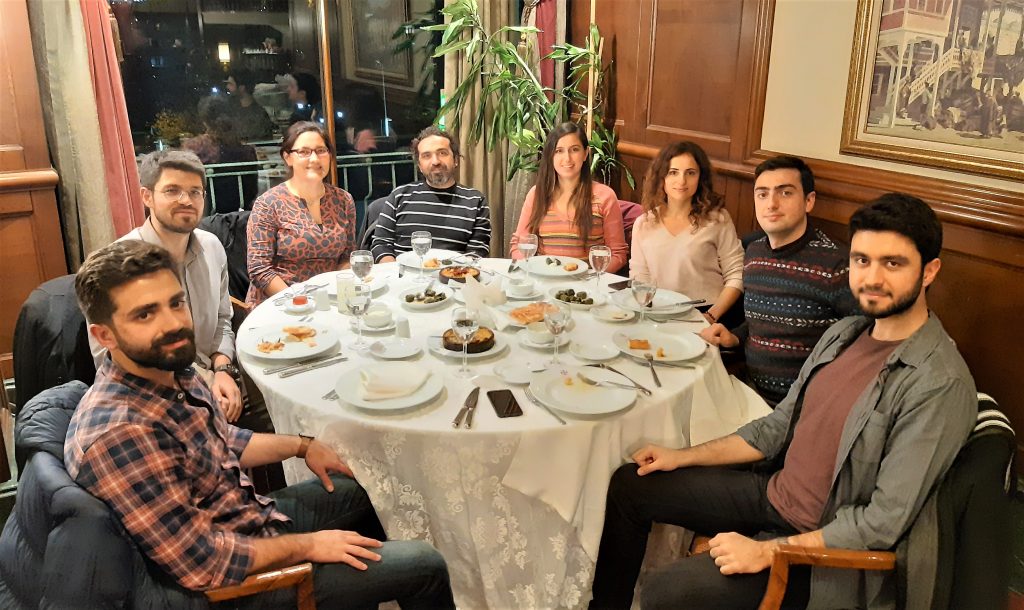
—
13 December 2019 (12:40): IEEE AP/MTT/EMC/ED Turkey Seminar Series (S.62)
Speaker: Asst. Prof. Arif Engin Çetin, İzmir Biomedicine and Genome Center
Topic: “The Use of Optics and Nano-Plasmonics for Point-of-Care Analysis in Resource-Poor Settings”
Location: Middle East Technical University, Ankara, Turkey
Abstract: In this talk, I will introduce portable and low-cost plasmonic biosensor platforms for resource-poor settings.
In recent years, research on plasmonic systems to overcome the limitations of biosensors brought new functionalities that do not exist in the traditional optical approaches. New generation plasmonic biosensor systems enable real-time detection of biomolecules at very low analyte concentrations without the need for optical labels. These systems stimulate optical responses with very sensitivity and high quality factor by employing surface plasmons, which are powerful surface electromagnetic waves, strongly localized in nanometer scale. Employing surface plasmons, conventional detectors, e.g., spectrometers, can be used to distinguish signal variations generated by the targeted biomolecules of interest.
In conventional spectrometer-based biosensing systems based on refractive index sensing, the presence of biomolecules in the samples are determined by monitoring the spectral shifts within the plasmonic responses. These platforms enable the detection of analytes, e.g., viruses or bacteria, at medically relevant concentrations that need to be identified for disease diagnostics in clinics, with simpler sample preparation protocols. Multiplexing and high-throughput capability of biosensors can be improved by integrating large-scale and high-density plasmonic chips to imaging-based platforms. By integrating plasmonic nano-chips into a telemedicine platform, these new generation plasmonic biosensors can be transformed into a portable platform to be deployed in resource-poor settings. These platforms can be also integrated to portable read-out devices, e.g., laptops or mobile phones, to provide highly sensitive label-free biosensing in inadequate medical infrastructure.
By integrating microfluidic technologies with portable plasmonic biosensing platforms, real-time analysis of protein-protein interaction kinetics can be also demonstrated in a cost-effective manner. Using powerful data processing algorithms, our microfluidic technology can monitor biomolecular binding interactions at pico-molar concentration levels.
Bio: Arif E. Cetin is a Research Group Leader in Izmir Biomedicine and Genome Center (IBG), Izmir, Turkey. Dr. Cetin received his BS degree in Electrical and Electronics Engineering and MS degree in Electrical and Computer Engineering both from Koc University, Istanbul, Turkey. He received his PhD degree in Electrical Engineering from Boston University, Boston, MA, USA. He worked as a postdoctoral fellow at EPFL, Lausanne, Switzerland in 2013–2014 and at MIT, Cambridge, MA, USA in 2014–2016, and as a research scientist at Omniome, Inc. San Diego, CA, USA in 2016–2018.
Dr. Cetin is pursuing research on optical nano-biosensors integrated with microfluidic platforms. He is developing hand-held biosensors for high-throughput and multiplexed biosensing. Recently, he is also developing a unique label-free technique for high-throughput DNA sequencing.
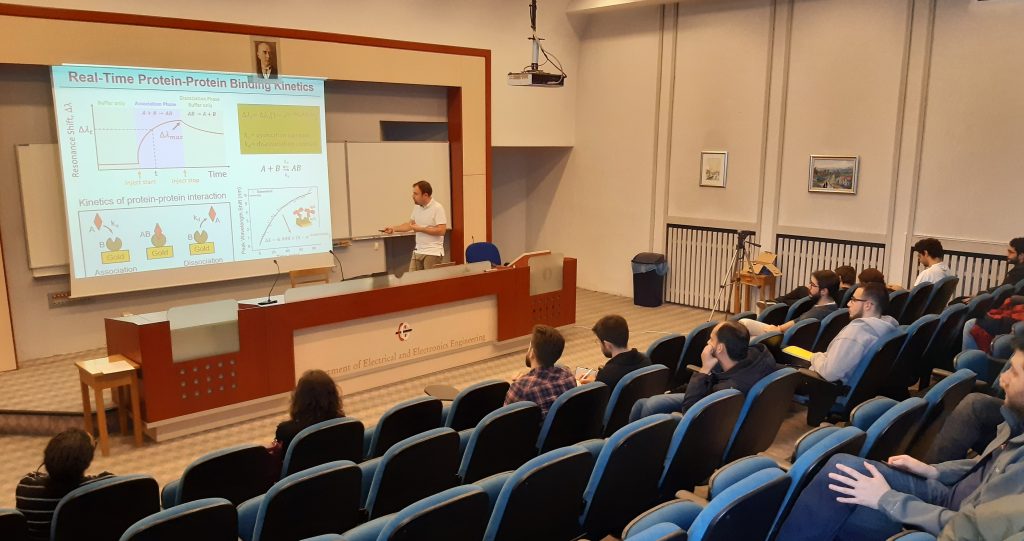
vTools Link: https://events.vtools.ieee.org/m/214780
—
06 December 2019 (13:40): IEEE AP/MTT/EMC/ED Turkey Seminar Series (S.61)
Speaker: Asst. Prof. Emine Ülkü Sarıtaş, Bilkent University
Topic: “Magnetic Particle Imaging for Radiation-Free Functional Imaging”
Location: Middle East Technical University, Ankara, Turkey
Abstract: Magnetic Particle Imaging (MPI) is a new biomedical imaging modality, first introduced in 2005. MPI uses the nonlinear magnetization response of superparamagnetic iron oxide (SPIO) tracers to image their spatial distribution. Because human tissues do not exhibit a similar response, they are completely transparent in MPI images. This desirable feature makes MPI a very high contrast tracer imaging modality. Unlike other tracer imaging modalities such as PET, MPI does not utilize any radioactive tracers of ionizing radiation for imaging. Since its first introduction, MPI has evolved rapidly in terms of both hardware development and image reconstruction schemes, and has found important applications such as angiography, stem cell imaging, and cancer imaging. This presentation will introduce the imaging principles of MPI and its potential functional imaging applications, in the light of our MPI efforts in National Magnetic Resonance Research Center (UMRAM) of Bilkent University.
Bio: Dr. Saritas graduated with B.S. degree in Electrical and Electronics Engineering from Bilkent University in 2002. She was awarded the Lucent Technologies Stanford Graduate Fellowship for her graduate studies at Stanford University at the Department of Electrical Engineering. There, she received her M.S. and Ph.D. degrees in 2004 and 2009, respectively. She then joined the Department of Bioengineering at University of California, Berkeley as a Siebel Stem Cell Institute Postdoctoral Fellow. She has been a faculty member at Bilkent University since September 2013. She is the recipient of the 2015 “Young Scientist Outstanding Achievement Award” given by TUBA, the 2016 “Young Scientist Award” (BAGEP) given by Bilim Akademisi, and the 2019 “Incentive Award” given by TUBITAK. She has also received the Distinguished Teaching Award of Bilkent University in 2018. Dr. Saritas is currently serving as an Associate Editor for IEEE Transactions on Medical Imaging, as an Editorial Board Member for the International Journal on Magnetic Particle Imaging (IJMPI), and as the chair of IEEE Turkey Section Women in Engineering (WIE).
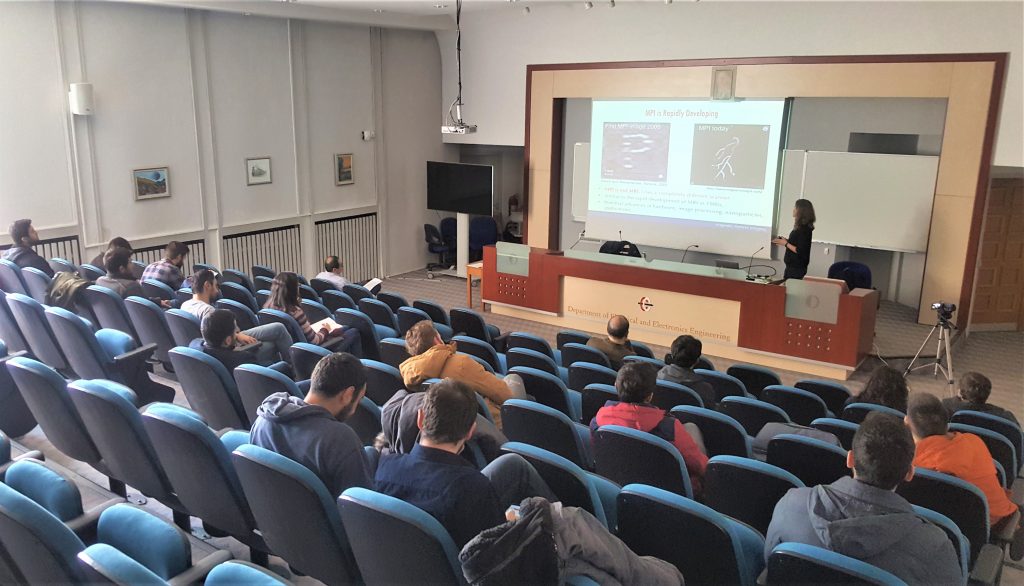
vTools Link: https://events.vtools.ieee.org/m/213490
—
29 November 2019 (13:40): IEEE AP/MTT/EMC/ED Turkey Seminar Series (S.60)
Speaker: Prof. Alper Demir, Koç University
Topic: “Nonstationary Low Frequency Noise in Switched MOSFET Circuits and Circuit Simulation”
Location: Middle East Technical University, Ankara, Turkey
Abstract: Modeling and analysis of low frequency noise under strongly time-varying bias conditions is a long-standing open problem in circuit simulation. In this talk, I will start with a brief tutorial introduction to noise modeling and analysis in electronic circuits. I will then present the background on the nonstationary low frequency noise modeling problem in circuit simulation and the legacy noise models. The computational modeling and analysis framework we have developed solves the problem and is based on an analogy that relates low frequency noise in transistors and electronic circuits to stochastic behavior of ion channels in biological neurons and stochastic chemical kinetics. I will present results on electronic circuit examples, namely switched MOSFET circuits and oscillators, which show that our computational models implemented in an electronic circuit simulator correctly predict the impact of nonstationary low frequency noise that match measurement data, whereas the legacy noise models produce erroneous results.
This talk is based on joint work with Dr. Gokcen Mahmutoglu (PhD, Koc University 2015).
Bio: Alper Demir graduated from Ankara Fen Lisesi, and subsequently received the BS degree from Bilkent University and the MS and PhD degrees from the University of California at Berkeley. Prof. Demir spent time at Motorola (Summer 1995), Cadence Design Systems (Summer 1996), Bell Laboratories Research (1997-2000), CeLight (2000-2002), MIT (Summer 2002, Spring 2017), and UC Berkeley (2009-2010). He has been with Koc University as a faculty member since 2002. His work on noise won several best paper awards: 2002 Best of ICCAD Award, 2003 and 2014 IEEE/ACM William J. McCalla ICCAD Best Paper Awards, and the 2004 IEEE Circuits and Systems Society Guillemin-Cauer Award. He was named an IEEE Fellow in 2012 for his contributions to stochastic modeling and analysis of phase noise.
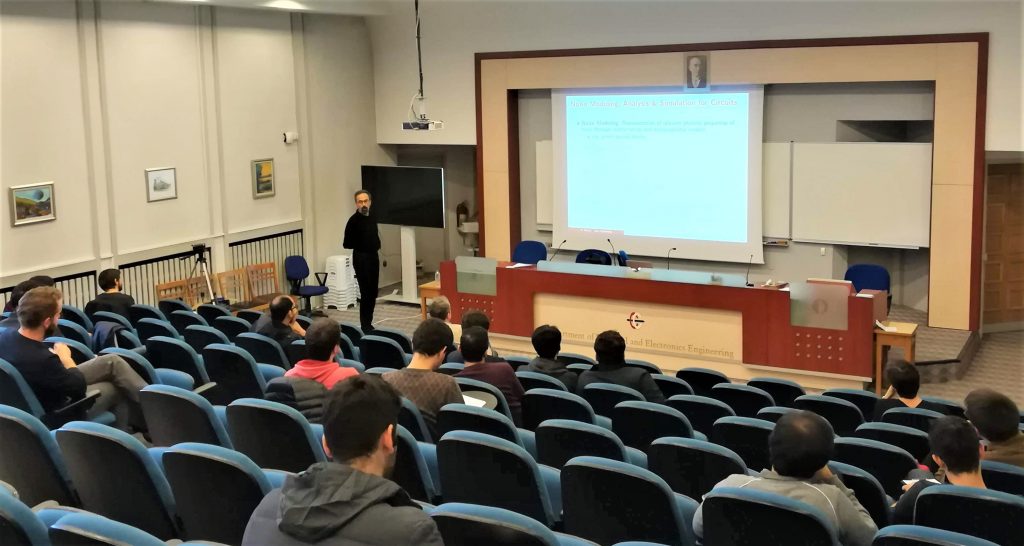
vTools Link: https://events.vtools.ieee.org/m/212904
—
22 November 2019 (12:40): IEEE AP/MTT/EMC/ED Turkey Seminar Series (S.59)
Speaker: Ufuk Batum
Topic: “Tekno Girişimcilik Işığında Biz Mühendisler”
Location: Middle East Technical University, Ankara, Turkey
Bio: Ufuk Batum 1967 doğumludur.
Ortaokul ve Lise: Robert Kolej
Üniversite: Boğaziçi Üniversitesi Makine Mühendisliği
Clemson Üniversitesi, MBA
15 yılı ABD, Fransa, İtalya’da olmak üzere 32 yıl boyunca farklı şirket ve sektörde üst düzey yöneticilik (Genel Müdür, CEO, Yönetim Kurulu Üyesi).
Özel sektör şirketlerinde, kamu ve üniversitelerde, uluslararası kuruluşlarda (Birleşmiş Milletler, NATO, TÜBİTAK, vb.) danışmanlık ve eğitmenlik.
Yaklaşık 50 ülkede konuşmacı, danışman veya proje lideri sıfatıyla olmak üzere 112 ülkeyi ziyaret etmiş ve işbirlikleri sağlamıştır.
8 kitabın, 1 çevirinin, onlarca raporun ve bini aşkın köşe yazısının yazarı. Boğaziçi ve ODTÜ gibi çeşitli üniversitelerin hocası.
Yaklaşık 3.000 teknoloji şirketinin mentorluğunu yapmış birisi olarak kendisi de girişimci, yenilikçi ve uluslararası arenada tanınan bir danışman ve konuşmacıdır.
Ayrıca, Türkiye ve çevre ülkelerde 14 teknoparkın kurucusu, yöneticisi ve danışmanı olarak görev yapmaktadır.
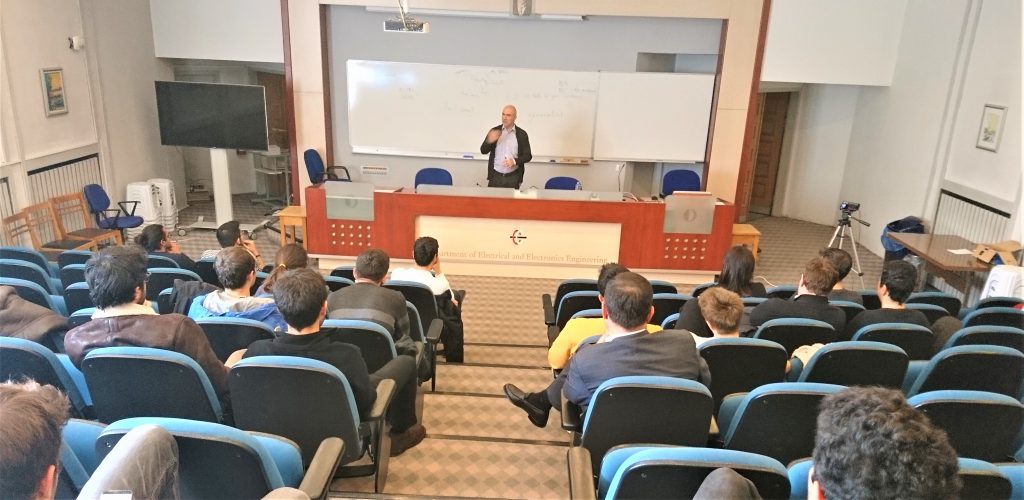
vTools Link: https://events.vtools.ieee.org/m/212166
—
15 November 2019 (12:40): IEEE AP/MTT/EMC/ED Turkey Seminar Series (S.58)
Speaker: Prof. Bayram Tekin, Middle East Technical University
Topic: “A Panoramic View of Modern Cosmology”
Location: Middle East Technical University, Ankara, Turkey
Abstract: Data coming from the past of the Universe, when interpreted with Einstein’s gravity theory and the standard model of particle physics give us a consistent history of the last 13.8 billion years since the Big Bang. I will give a broad overview of what we know about the universe at large, describing how Einstein’s equations are applied to the dynamics of the Universe. Cosmic microwave background, the relic radiation coming from the time when the Universe was around 400 thousand years old, will be described in some detail.
Bio: Bayram Tekin received his Ph.D. degree from the University of Minnesota in 1999. He was a postdoctoral researcher at the University of Oxford from 1999 to 2001 and at Brandeis University from 2001 to 2003. He has been with the Department of Physics at Middle East Technical University since 2003.
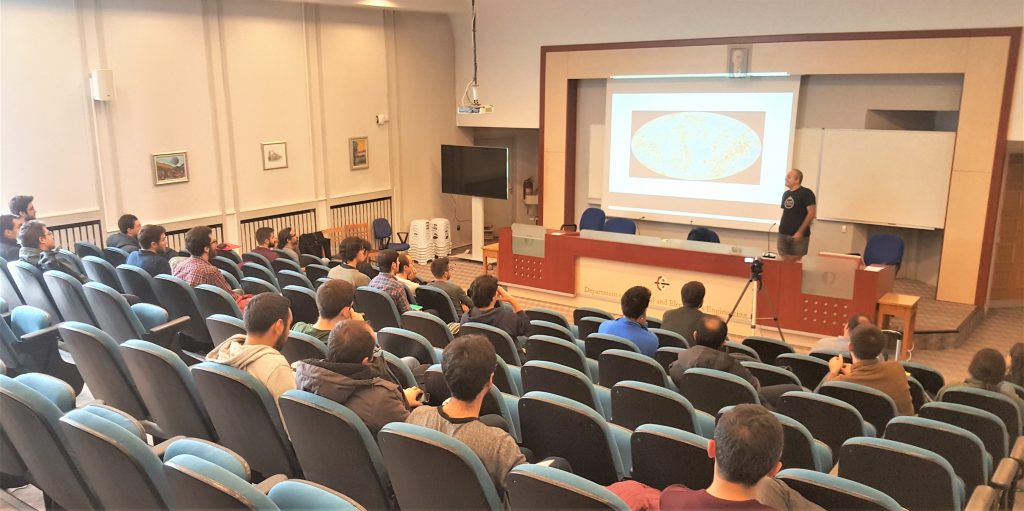
vTools Link: https://events.vtools.ieee.org/m/211126
—
08 November 2019 (12:40): IEEE AP/MTT/EMC/ED Turkey Seminar Series (S.57)
Speaker: Asst. Prof. Naci Saldı, Özyeğin University
Topic: “Non-signaling approximations of decentralized stochastic control problems”
Location: Middle East Technical University, Ankara, Turkey
Abstract: Decentralized stochastic control theory studies decisions of agents that are acting collectively based on their local information to optimize a common cost function under stochastic uncertainty. It will be a prominent avenue of research for many years to come as modern control systems are increasingly decentralized and interconnected. Currently available techniques (such as classical dynamic programming, policy iteration, value iteration, linear programming, etc.) in centralized stochastic control does not apply under decentralized and asymmetric information structures. Even for a very simple decentralized stochastic control problem (i.e., Witsenhausen’s counterexample), application of classical methods for obtaining good strategies leads to poor performance. Moreover, we note that computing optimal strategies for decentralized stochastic control problems is in general known to be NP hard. Hence, we need new viewpoints and new approaches that overcome decentralized nature of the problem. In this talk, I will consider non-signaling approximation of finite decentralized stochastic control problems. I will first introduce a hierarchy of control policies that can be classified in an increasing order as randomized policies, quantum-correlated policies, and non-signaling policies. Then, I will establish an approximation of optimal policies for decentralized stochastic control systems via extendible nonsignaling policies. I will show that the distance between extendible non-signaling policies and decentralized policies is small if the extension is sufficiently large. Using this result, I will establish a linear programming (LP) approximation of decentralized stochastic control problems. Finally, I will state an open problem regarding computation of optimal value of quantum-correlated policies.
Bio: Naci Saldi received the B.Sc. and M.S. degrees in Electrical and Electronics Engineering from Bilkent University in 2008 and 2010, respectively and the Ph.D. degree in Department of Mathematics and Statistics from Queen’s University in 2015. He was a postdoctoral researcher at the University of Illinois at Urbana-Champaign before joining the Department of Natural and Mathematical Sciences at Özyeğin University as an Assistant Professor. He is a co-author of the book Finite Approximations in Discrete-Time Stochastic Control, published by Springer. His research interests include stochastic and decentralized control, source coding, mean-field games, and applied probability.
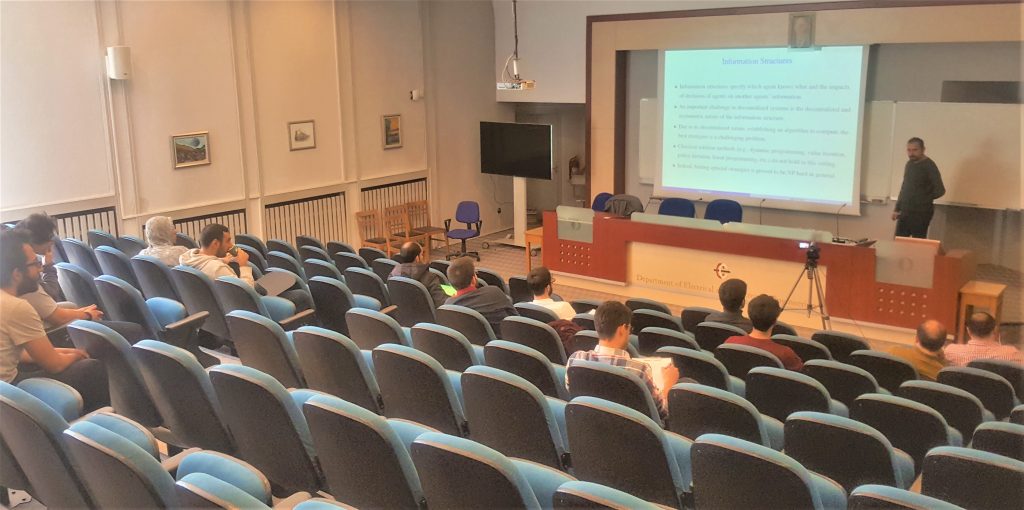
vTools Link: https://events.vtools.ieee.org/m/211124
—
01 November 2019 (13:40): IEEE AP/MTT/EMC/ED Turkey Seminar Series (S.56)
Speaker: Prof. Sinan Gezici, Bilkent University
Topic: “Fundamental Limits and Resource Allocation for Visible Light Positioning”
Location: Middle East Technical University, Ankara, Turkey
Abstract: Visible light communication (VLC) is an emerging paradigm that facilitates multiple functionalities including illumination, high-speed data communications, and localization. Based on the VLC technology, visible light positioning (VLP) systems aim to estimate locations of VLC receivers based on light-emitting diode (LED) transmitters at known locations. VLP presents a viable alternative to radio frequency (RF)-based positioning systems by providing inexpensive and accurate localization services. In this talk, we consider the problem of localization in visible light systems and investigate distance and position estimation approaches in synchronous and asynchronous scenarios, focusing on both theoretical performance characterization and algorithm development aspects. In addition, we propose a power allocation framework for VLP systems based on convex optimization approaches. Simulation results reveal various benefits of the proposed approaches.
Bio: Sinan Gezici received the B.S. degree from Bilkent University, Turkey in 2001, and the Ph.D. degree in Electrical Engineering from Princeton University in 2006. From 2006 to 2007, he worked at Mitsubishi Electric Research Laboratories, Cambridge, MA. Since 2007, he has been with the Department of Electrical and Electronics Engineering at Bilkent University, where he is currently a Professor. Dr. Gezici’s research interests are in the areas of detection and estimation theory, wireless communications, and localization systems. Among his publications in these areas is the book Ultra-wideband Positioning Systems: Theoretical Limits, Ranging Algorithms, and Protocols (Cambridge University Press, 2008). Dr. Gezici was an associate editor for IEEE Transactions on Communications, IEEE Wireless Communications Letters, and Journal of Communications and Networks.
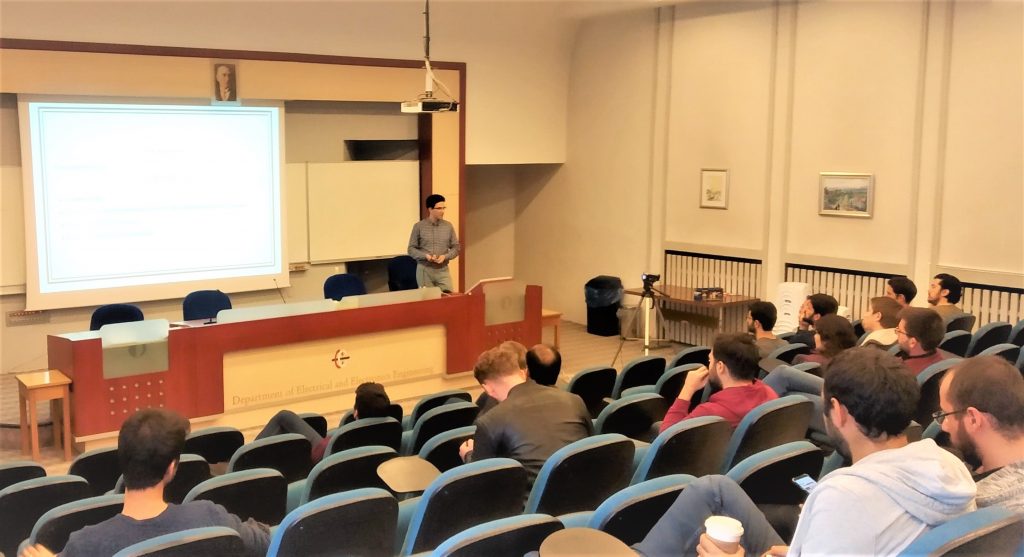
vTools Link: https://events.vtools.ieee.org/m/209758
—
25 October 2019 (12:40): IEEE AP/MTT/EMC/ED Turkey Seminar Series (S.55)
Speaker: Asst. Prof. Erdinç Tatar, UNAM, Bilkent University
Topic: “Finding Solutions to the MEMS Gyroscope Drift Problem”
Location: Middle East Technical University, Ankara, Turkey
Abstract: In this talk, I will mainly focus on my PhD research in Carnegie Mellon University and extending my PhD work on sensor drift suppression. One major performance limiting problem that is common among most of the sensors is the drift. Environmental stress and temperature effects are believed to be the major source of the drift and the latter is studied the most in the literature. Certain enhancements are achieved but the sensor drift cannot be removed completely by temperature compensation. My PhD thesis successfully addressed the drift problem for gyroscopes by incorporating the stress sensor and the gyroscope on the same die for the first time. Through ovenization my research demonstrated that stress compensation suppresses the long term drift by seven fold. Since stress compensation achieved promising results, I would like to extend this work by designing better on-chip stress sensors, investigating the die stress with different die attaches and die mount techniques, and applying stress compensation to a circular gyroscope.
High drive displacement improves the signal to noise ratio of a resonator but also leads to a nonlinear force displacement behavior that is observable as a hysteresis in the frequency-phase and frequency-amplitude relations. My thesis proposed a cubically shaped nonlinearity tuning comb finger design that cancels the inherent softening nonlinearity of the gyroscope drive mode by introducing a DC voltage controlled hardening nonlinearity. The functionality of the fingers was demonstrated and cancelling drive nonlinearities resulted in a better bias instability compared to the high displacement with nonlinear characteristics.
Finally, I will conclude my talk with my near term research interests that include designing a better stress compensated gyroscope and developing acoustic resonance gas sensors.
Bio: Erdinc Tatar was born in Denizli, Turkey. He received B.S. and M.S. degrees (with high honors) in Electrical and Electronics Engineering from Middle East Technical University (METU), Ankara, Turkey, and Ph.D. degree in Electrical and Computer engineering from Carnegie Mellon University, Pittsburgh, PA, in 2008, 2010, and 2016 respectively. He was a Graduate Research Assistant with Micro-Electro-Mechanical Systems Research and Applications Center, METU, and with Carnegie Mellon University from 2008 to 2011, and 2012 to 2016, respectively. From 2016 to 2019 he worked as a MEMS Design Engineer responsible for the development of next generation gyroscopes in Analog Devices, Inc., Wilmington, MA. Currently he is an assistant professor with the Department of Electrical and Electronics Engineering and UNAM in Bilkent University. His research interests include MEMS sensors (specifically Inertial and Gas sensors), microfabrication and packaging technologies, and readout and control electronics for MEMS sensors. Dr. Tatar has authored multiple IEEE journal and conference papers. He also serves as a reviewer for major MEMS journals such as Journal of Micromechanics and Microengineering and IEEE Sensors.
vTools Link: https://events.vtools.ieee.org/m/208403
—
18 October 2019 (12:40): IEEE AP/MTT/EMC/ED Turkey Seminar Series (S.54)
Speaker: Prof. Ekmel Özbay, Bilkent University
Topic: “A Review of Turkish GaN HEMT Technology Activities for RF Applications”
Location: Middle East Technical University, Ankara, Turkey
Abstract: In this talk, we will review the history, current status and future prospects of the Turkish GaN HEMT technology activities for RF and power electronics applications. After several years of academic research in this area, we have successfully launched a spin-off company and a joint venture between university and industry (Aselsan Bilkent Micro Nano Technologies Inc.) where we have developed the related GaN technologies that includes MOCVD growth, nanoscale fabrication, small and large signal circuit modeling, RF design, reliability and packaging for GaN based HEMT and MMICs that operate from 50 MHz to 40 GHz and beyond.
Bio: Prof. Dr. Ekmel Ozbay received the B.S. degree from Middle East Technical University and M.S. and Ph.D. degrees from Stanford University in electrical engineering, in 1987, 1989 and 1992. He worked as a postdoc in Stanford University and he worked as a scientist in Iowa State University. He joined Bilkent University (Ankara, Turkey) in 1995, where he is currently a full professor in Physics and EEE Departments. In 2003, he founded Bilkent University Nanotechnology Research Center (NANOTAM) where he leads a research group working on nanophotonics, nanometamaterials, nanoelectronics, and GaN based devices. He is the 1997 recipient of the Adolph Lomb Medal of OSA and 2005 European Union Descartes Science award. He worked as an editor for Optics Letters, PNFA, SPIE JNP and IEEE JQE journals. He has published 495+ articles in SCI journals. His papers have received 17000+ SCI citations with an h-index of 58. He has given 165+ invited talks in international conferences. He recently became the CEO of a spin-off company: AB-MicroNano Inc.
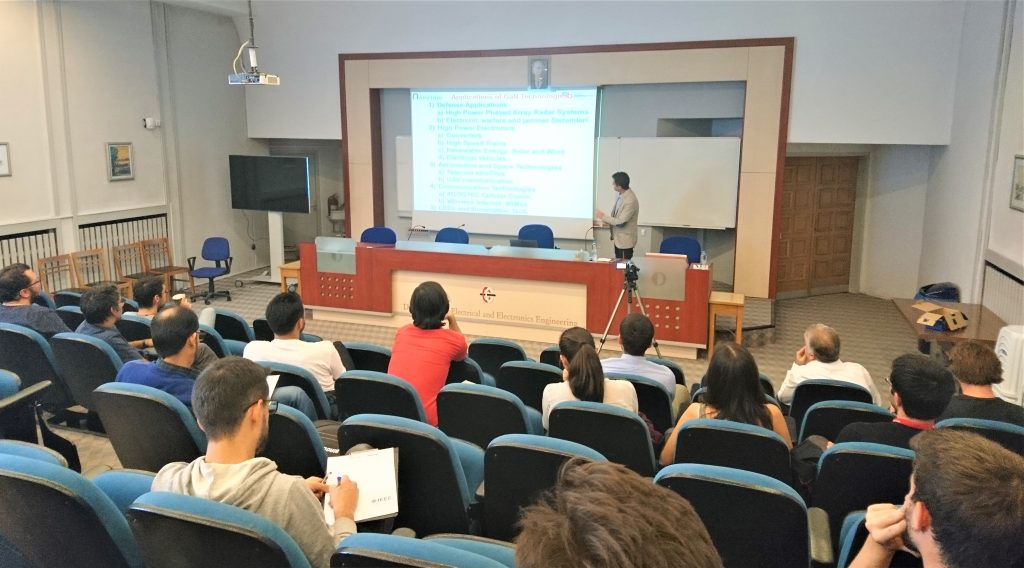
vTools Link: https://events.vtools.ieee.org/m/207440
—
11 October 2019 (13:40): IEEE AP/MTT/EMC/ED Turkey Seminar Series (S.53)
Speaker: Asst. Prof. Ercüment Çiçek, Bilkent University
Topic: “SPADIS: An Algorithm for Selecting Predictive and Diverse SNPs in Genome-wide Association Studies”
Location: Middle East Technical University, Ankara, Turkey
Abstract: Complex traits often cannot be explained by individual variants. Therefore, the efficient selection of multiple loci that explain the phenotype is critical for understanding the genetic basis of these traits. Selecting multiple loci is a computationally challenging problem that grows exponentially with the number of genomic variants. Many methods tackle this problem by focusing on coding regions to reduce the complexity of the problem. However, these approaches ignore the non-coding regions and introduce literature bias. As one alternative, regularized regression methods have been used; however, they do not allow the incorporation of background biological knowledge and suffer from long execution times. Currently, there is only one machine learning method in the literature, which aims to select a large set of loci efficiently by incorporating biological background information – SConES. SConES selects a set of features guided by a SNP-SNP network and favors the selection of SNPs that are connected on the network. We argue that while connectedness assumption is frequently used for functionally related features, it leads to the selection of redundant features when the goal is to explain a complex phenotype. In the current study, we hypothesize that selecting features on an SNP-SNP network that are diverse in term of location would correspond to incorporating complementary terms and thus, would help to explain the phenotype better. We present SPADIS that implements this novel idea by maximizing a submodular set function with a greedy algorithm that ensures a constant factor approximation to the optimal solution. We compare SPADIS to the state-of-the-art method SConES on a dataset of Arabidopsis Thaliana genotype and continuous flowering time phenotypes. We show that (i) SPADIS has better average phenotype prediction performance in 15 out of 17 phenotypes when the same number of SNPs are selected and provides consistent and statistically significant improvements in regression performance on average across multiple networks and settings, (ii) it identifies more candidate genes, and (iii) runs much faster compared to other methods. We also perform rigorous simulation experiments and compare SPADIS with off the shelf regression-based feature selection methods and show that SPADIS outperforms its counterparts.
Bio: Ercument Cicek earned his BS (2007) and MS (2009) degrees in Computer Science and Engineering from Sabanci University. He received his Ph.D. degree in Computer Science from Case Western Reserve University in 2013. During his Ph.D., he visited Cold Spring Harbor Laboratory to work on gene discovery algorithms for Autism Spectrum Disorder in 2012. After graduation, he worked as a Lane Fellow in Computational Biology at Carnegie Mellon University till 2015. Since then, he is an Asst. Prof. in the Computer Engineering Department of Bilkent University and is an adjunct faculty member in Computational Biology Department of Carnegie Mellon University. His research is mainly focused on designing machine learning algorithms for analysis of large-scale biological data. He is the recipient of Simons Foundation Autism Research Initiative (SFARI) Explorer Award, SFARI Pilot Award, TUBITAK Career Award, TUBA-GEBIP Award and Parlar Foundation Research Incentive Award.
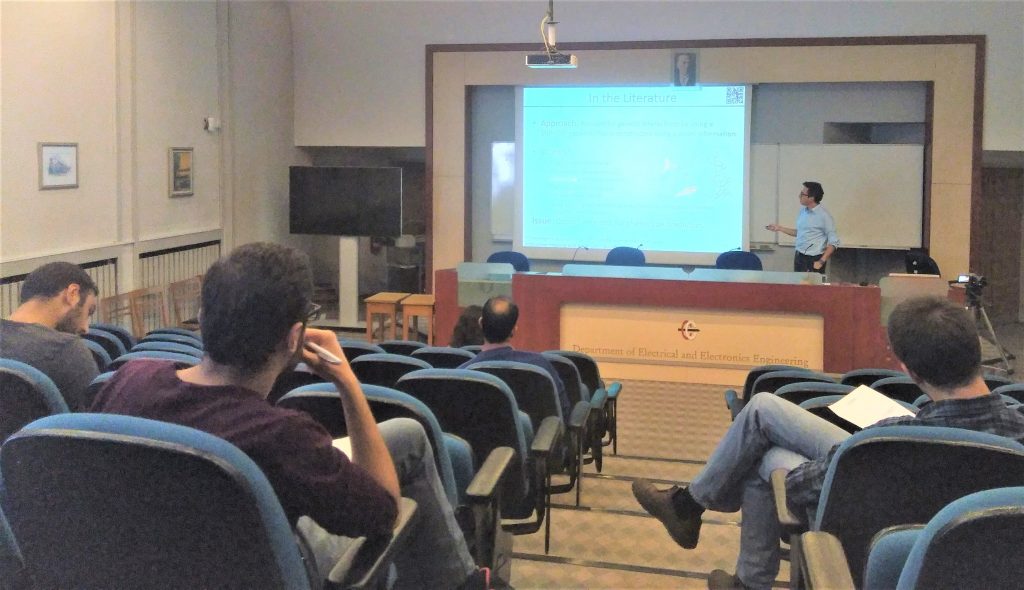
vTools Link: https://events.vtools.ieee.org/m/207440
—
09-11 September 2019: Technical Sponsorship for BEYOND 2019: Computational Science and Engineering Conference at Middle East Technical University, Ankara, Turkey
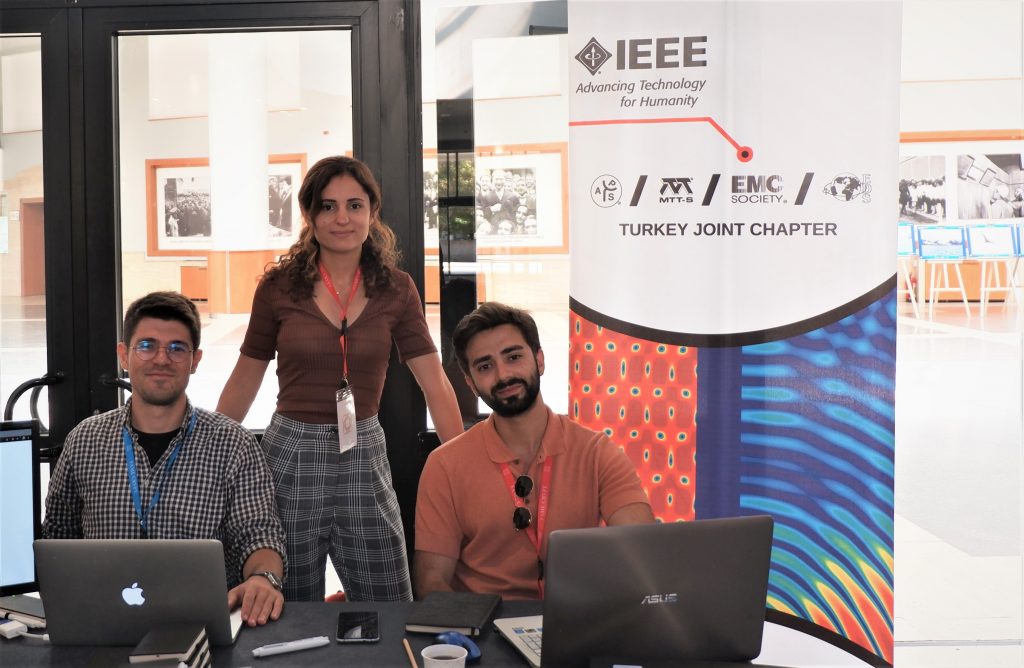
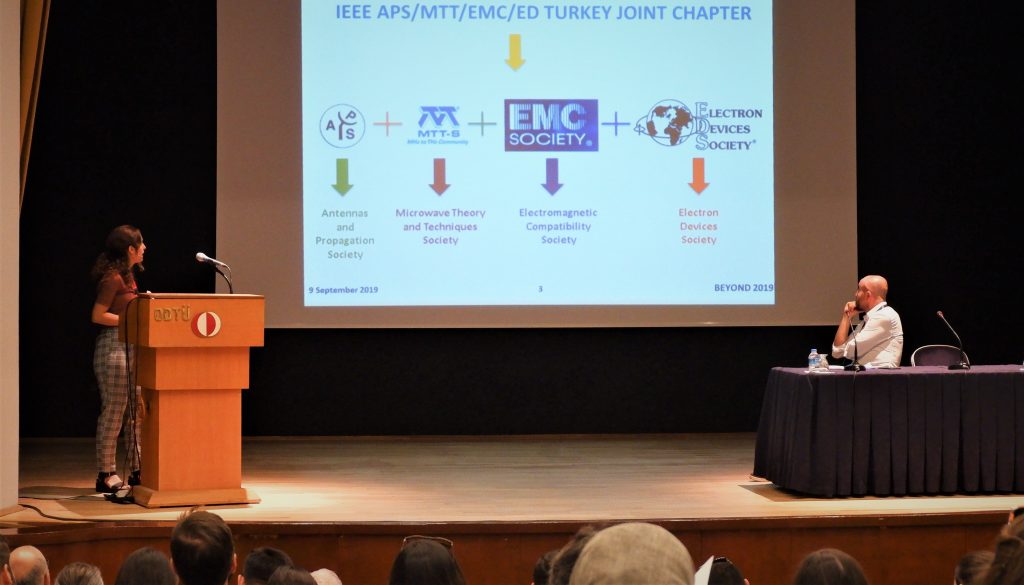
—
17 May 2019 (13:40): IEEE AP/MTT/EMC/ED Turkey Seminar Series (S.52)
Speaker: Prof. F. Ömer Ilday, Bilkent University
Topic: “Ultrafast Laser-Driven Self-Organized Nano- and Micro-Structuring”
Location: Middle East Technical University, Ankara, Turkey
Abstract: Ultrafast laser processing has diverse applications, including creation of precision microstructures. However, scaling down to the nanoscale is strongly limited by the wavelength of the laser and by the cubic size of processing time with the spatial resolution, which we refer to, colloquially, as the “fat fingers problem,” the “explosion of complexity problem” and the increasingly strong thermal fluctuations.
The alternative approach that we are pursuing is to utilize laser-driven self-organization and self-assembly to put together the intended structures, which can be arbitrarily smaller than the wavelength of the laser beam. These structures are, then, dictated by the nonlinear dynamics of the system, which can be of a multitude of forms to be chosen from a limited, by rich library. We can choose them by adjusting only one or few parameters, typically, the laser power or polarization and different regions within a material can have different structures.
Our approach follows the principles laid out by luminaries like I. Progogine and H. Haken, already, in 1960s and 1970s, but was not applied to laser-material processing largely because much of the technologies we rely on did not yet exist. Our implementation is inspired by the physics of mode-locking of lasers, whereby modes that lock up in phase experience preferential “gain” over having random phases, which leads to a coherent structure in time. Similarly, we arrange for a certain coherent (typically periodic, but potentially aperiodic, as well) spatial structure to experience higher gain over the alternatives. In case of materials, this is achieved by driving the material locally far from thermodynamic equilibrium, which is necessary to gain access to multitude of spatial structures to choose from. Higher “gain” is achieved by invoking nonlinearities in the form of positive feedback between laser beam-induced changes in the material and material change-induced effects back on the laser beam.
We first showed that we could create laser-induced spatial nanostructures on various material surfaces with unprecedented uniformity (Ilday et al., Nature Photon., 2013). Afterwards, we have showed the benefits of nonlinear feedback in extremely efficient laser-material ablation (Ilday et al., Nature, 2016), creation of self-organized 3D structures inside silicon (Ilday et al., Nature Photon., 2017), and self-assembly of colloidal nanoparticles (Ilday et al., Nature Commun., 2017). We recently extended our results to self-assembly of colloids as small as a few nanometers, which is orders of magnitude smaller than the laser beam size that we use. We will also discuss how the symmetries of the feedback interactions determine the symmetries of self-organized patterns, and how we can use even “noise” to select desired patterns.
In these demonstrations, we have worked with physical systems that were deliberately chosen to be completely different from each case, from a silicon crystal to molybdenum surfaces or colloidal nanoparticles, to show that this approach is not material, size, or interaction specifics. Their commonality is that they are all nonlinear systems, which we deliberately drive far from equilibrium with the laser pulses. Although our focus is on understanding the basic physics, the talk will briefly showcase several applications.
Bio: Dr. F. Ömer Ilday received the BS degree in theoretical physics from Boğaziçi University, Istanbul, Turkey, in 1998. He took his PhD in applied physics from Cornell University, Ithaca, NY, USA, in 2003. He worked at Massachusetts Institute of Technology (MIT) from 2003 to 2006. In 2006, he joined Bilkent University as faculty member. He was awarded the European Research Council’s prestigious Consolidator Grant in 2013, the first consolidator grant and the first ERC grant on basic science in Turkey. Dr. Ilday graduated valedictorian of the top-ranked Physics Department at Bogazici University in 1998. In 2003, he received the prestigious RLE Fellowship from MIT. His contributions to science have been generously recognized through various awards, including Findlay Award from Cornell University (2004), Outstanding Young Scientist Award from the Turkish Academy of Sciences (TÜBA-GEBIP) (2006), Teşvik Award from the Scientific and Technological Research Council of Turkey (TÜBİTAK) (2011), Engin Arık Science Award from the Turkish Physical Society (2012) and the top award in science in Turkey, the Science Award of TÜBİTAK (2017). He is a full member of the Science Academy of Turkey and a senior member of the Optical Society (OSA).
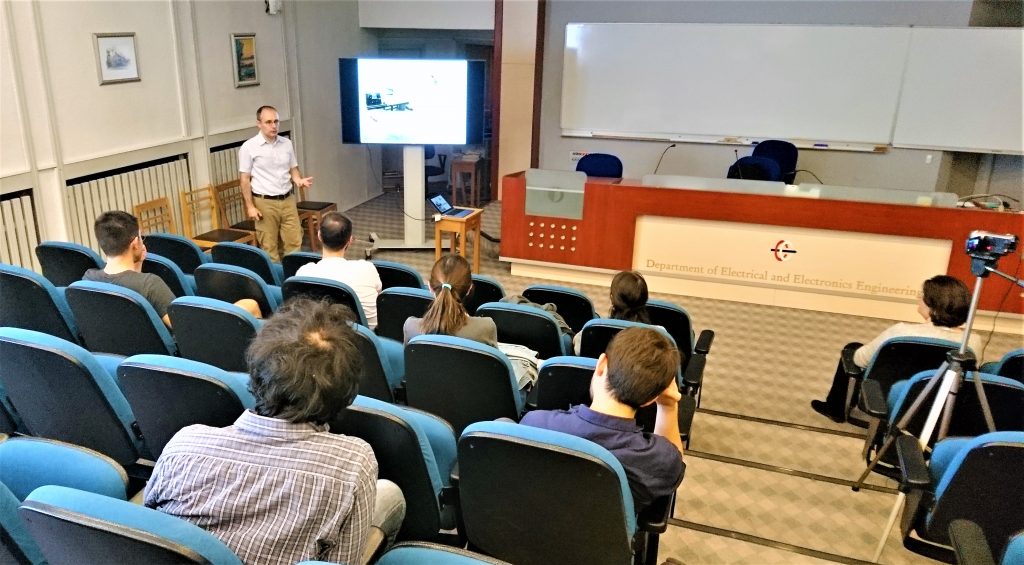
vTools Link: https://events.vtools.ieee.org/m/199497
—
10 May 2019 (13:40): IEEE AP/MTT/EMC/ED Turkey Seminar Series (S.51)
Speaker: Dr. Derya Malak, Massachusetts Institute of Technology and Northeastern University
Topic: “Coordinating Caching and Computation in Networks”
Location: Middle East Technical University, Ankara, Turkey
Abstract: This talk focuses on the central problem of coordinating computation and caching in networks, using some recent results in stochastic geometry and information theory. Our goal is to provide a FAST, RELIABLE, and CHEAP design for 5G mobile networks. The first part of the talk focuses on decentralized caching by utilizing the redundancy across multiple, geo- dispersed, and mobile sources of data. In order to leverage proximity-based communications such as peer-to-peer systems or device-to-device communications, we exploited the spatial diversity of the content and the topology as a proxy for optimizing cache placement. We proposed novel decentralized and spatial exclusion-based cache placement policies. These policies promote diversity and reciprocation (FAST); provide guarantees on the cache hit probability (RELIABLE); and offload traffic from congested base stations, and are promising for proximity-based applications (CHEAP). The second part of the talk concerns with the limits of reliability with imperfect feedback when coding, and development of scalable and robust routing solutions for connectivity in wireless mesh networks. This approach utilizes coding for optimizing the tradeoff between in-order delivery delay and throughput, which is promising for computing systems such as the Internet of things, and ultra-reliable and low-latency communications e.g. mission-critical communications, and connected vehicles in 5G networks (FAST). It also provides robustness and delay guarantees (RELIABLE); and has very low complexity in terms of coding overhead, and is cost effective via the use of multi-hop WiFi links (CHEAP). Finally, this talk describes a new perspective on cloud/fog computing, by coordinating caching and computation in order to handle the large volume of data with growing computational demand. Our goal is to devise coding techniques for functional compression, and coordinating computation and caching in networks, by employing the concepts of graph entropy and function surjectivity. These techniques suit different applications such as caching, classification, federated learning, quantization, and compressed sensing. Our unified insights suggest to cache at the edge (FAST); distribute storage by exploiting geographic diversity and paths (RELIABLE); and distribute computation by making use of underlying redundancy both in data and functions, in order to recover a sparse representation, or labeling (CHEAP).
Bio: Derya Malak is a Postdoctoral Associate at the Massachusetts Institute of Technology and Northeastern University, where she has been working with Prof. Muriel Médard and Prof. Edmund Yeh, respectively. She received a Ph.D. in Electrical and Computer Engineering at the University of Texas at Austin under the supervision of Prof. Jeffrey G. Andrews, in August 2017, where she was affiliated with the Wireless Networking & Communications Group (WNCG). Previously, she received an M.S. degree in Electrical and Electronics Engineering at Koc University, Istanbul, Turkey, in February 2013. She received a B.S. in Electrical and Electronics Engineering (with minor in Physics) at Middle East Technical University, Ankara, Turkey, in June 2010. Derya has held summer internships at Huawei Technologies, Plano, TX, and Bell Laboratories, Murray Hill, NJ. She was awarded the Graduate School fellowship by the University of Texas at Austin between 2013-2017. She was selected to participate in the Rising Stars Workshop for women in EECS, MIT, in October 2018.
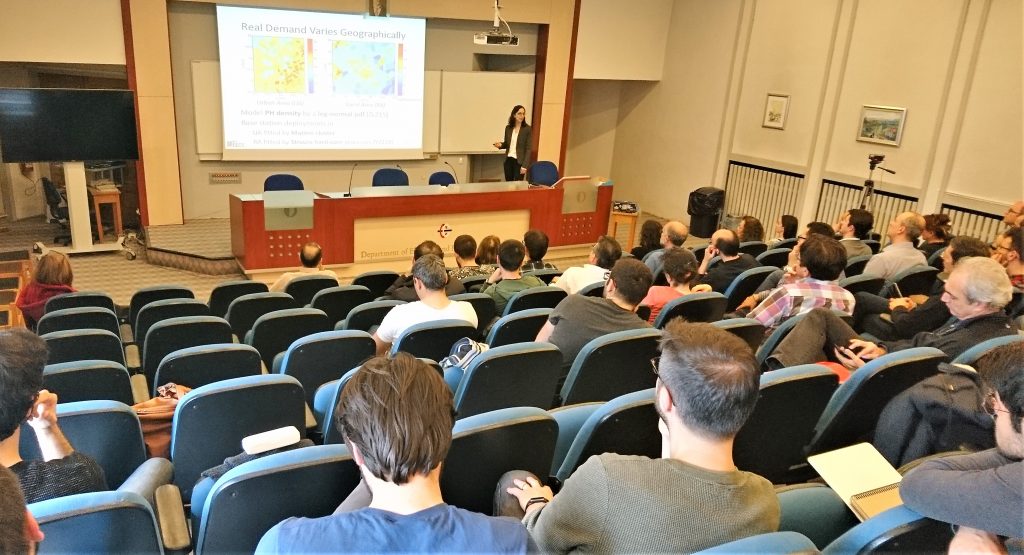
vTools Link: https://events.vtools.ieee.org/m/199494
—
03 May 2019 (13:40): IEEE AP/MTT/EMC/ED Turkey Seminar Series (S.50)
Speaker: Assoc. Prof. Uluç Saranlı, Middle East Technical University
Topic: “Model-Based, Reactive Control of Legged Locomotion on Rough Terrain”
Location: Middle East Technical University, Ankara, Turkey
Abstract: Legged mobility has long been among key research areas in mobile robotics. In this context, accurate dynamic models of locomotory behaviors provide tools that are useful both in understanding biological systems as well as constructing robots and controllers to realize these behaviors. In this talk, I will focus on the latter, using spring-mass models that have been instrumental in the understanding and artificial realization of running behaviors. I will first describe our work in finding approximate analytic solutions for spring-mass models of running, followed by an application of these approximations in reactive footstep planning on rough terrain. Subsequently, I will describe a new, efficient method for energy regulation for such systems based on virtual tuning of leg damping that facilitates eventual physical realization of this model-based approach, characterizing performance through both simulations and experiments.
Bio: Dr. Uluç Saranlı is a Professor in the Department of Computer Engineering in Middle East Technical University, Ankara, Turkey. He received his B.S. degree in Electrical and Electronics Engineering from The Middle East Technical University, Turkey in 1996. He received his M.S. and Ph.D. degrees in Computer Science from The University of Michigan in 1998 and 2002, respectively. He then joined the Robotics Institute in Carnegie Mellon University as a postdoctoral associate until 2005. Before joining Middle East Technical University in 2012, he was an Assistant Professor in the Department of Computer Engineering in Bilkent University. His research interests focus on autonomous robotic mobility, with specific contributions in modeling, analysis, control of legged locomotion and behavioral planning for dynamically dexterous robot morphologies.
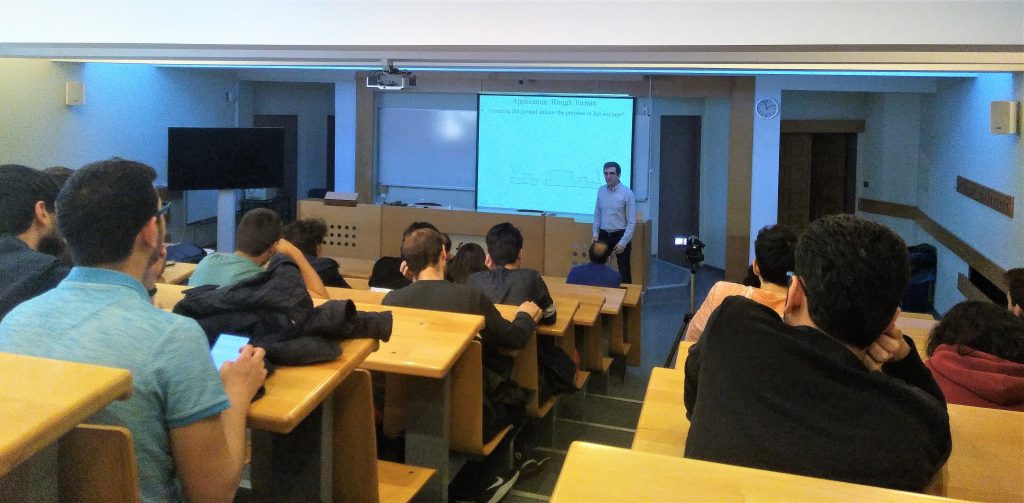
vTools Link: https://events.vtools.ieee.org/m/198697
—
26 April 2019 (13:40): IEEE AP/MTT/EMC/ED Turkey Seminar Series (S.49)
Speaker: Dr. Ali Bayramoğlu
Topic: DAVRANIŞSAL ESNEME SEMİNERİ: D3Ğİ5İM E2BER B02AR
Location: Middle East Technical University, Ankara, Turkey
PDFs (in Turkish):
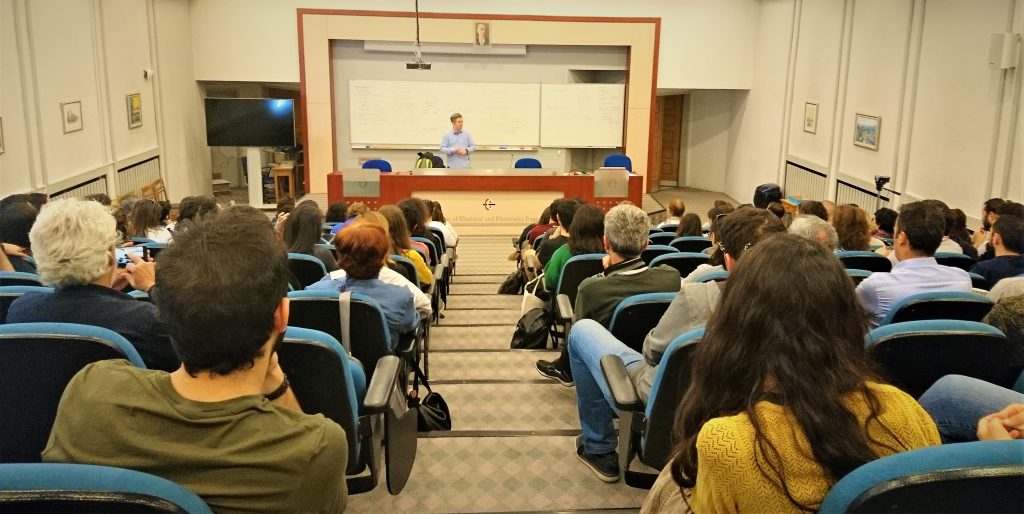
vTools Link: https://events.vtools.ieee.org/m/198690
—
12 April 2019 (13:40): IEEE AP/MTT/EMC/ED Turkey Seminar Series (S.48)
Speaker: Assoc. Prof. Melda Yüksel, TOBB-ETÜ
Topic: “Precoder Design for Downlink Multiuser MIMO Systems”
Location: Middle East Technical University, Ankara, Turkey
Abstract: In this work, a downlink wireless communication channel is considered. The base station (BS) has common data for all users, unicast data for a set of intended users, and transmits the superposition of these messages. This setting neither falls into the non-orthogonal multiple access (NOMA) nor into the multi-group multicasting literatures. In NOMA systems, the BS has unicast data for all users, and multiple users share the same resources. In multi-group multicasting, there are non-overlapping groups, each demanding a different multicast message. This paper studies precoder design to achieve maximum weighted sum rate (WSR). It is first shown that the precoders designed for WSR maximization and weighted minimum mean square error (WMMSE) minimization are equivalent. Secondly, an iterative, low complexity algorithm (named as WMMSE), based on WMMSE transmit precoders and receivers, is proposed. Another low-complexity precoder, the phase aligned zero forcing (PAZF) precoder is also introduced. The results show that both algorithms converge fast. The WMMSE algorithm outperforms both PAZF and the zero-forcing (ZF) precoder for all signal-to-noise ratio (SNR) ranges. It offers better interference management and high coherent combining gains for common data, while PAZF finds the optimal phase rotation on the ZF precoder, and increases coherent combining gains.
Bio: Melda Yuksel received the B.S. degree in electrical and electronics engineering from Middle East Technical University, Ankara, Turkey, in 2001, and the Ph.D. degree in electrical engineering from Polytechnic Institute of New York University, Brooklyn, NY, in August 2007. She joined TOBB University of Economics and Technology, Ankara, Turkey, in Fall 2007, where she is currently an associate professor. Her research interests are in information theory, communication theory and wireless communications. Dr. Yuksel is the recipient of the best paper award at the Communication Theory Symposium of the 2007 IEEE International Conference on Communications and the Turkish National Science Foundation CAREER Award. Dr. Yuksel was the treasurer of 2013 IEEE International Symposium of Information Theory. She is currently serving as an editorial board member of PHYCOM, Physical Communication.
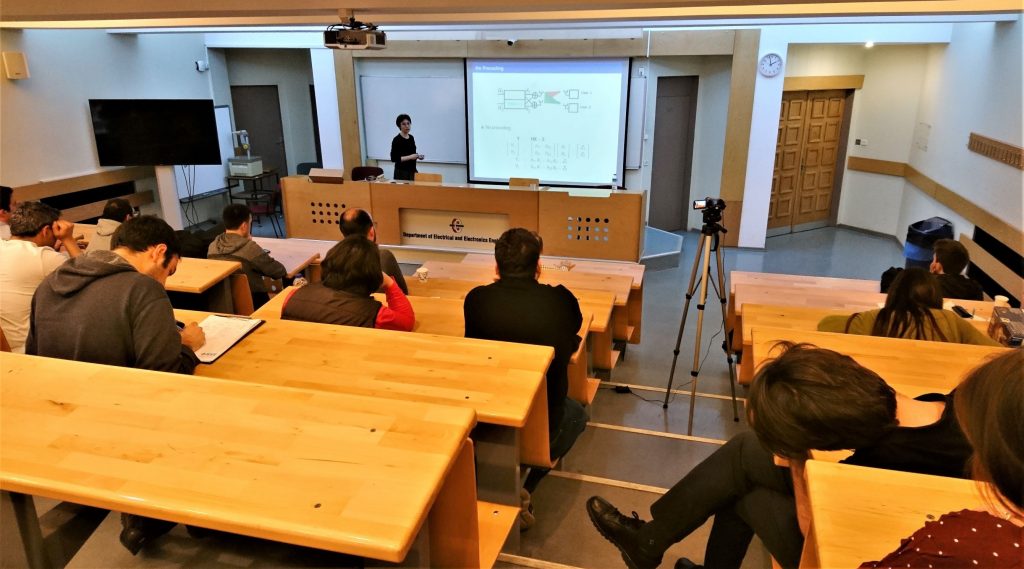
vTools Link: https://events.vtools.ieee.org/m/198004
—
05 April 2019 (13:40): IEEE AP/MTT/EMC/ED Turkey Seminar Series (S.47)
Speaker: Prof. Abdullah Atalar, Bilkent University
Topic: “Research Ethics”
Location: Middle East Technical University, Ankara, Turkey
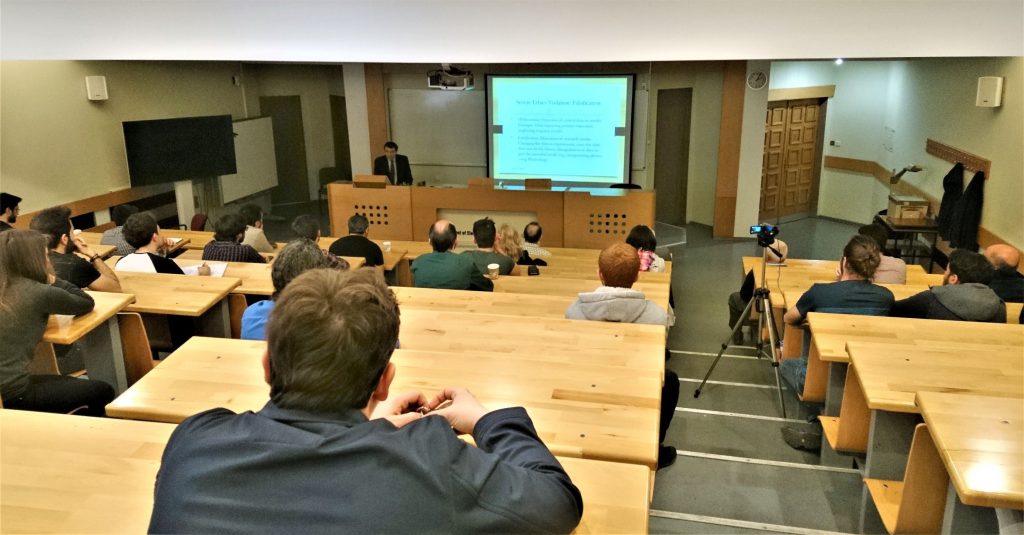
vTools Link: https://events.vtools.ieee.org/m/197373
—
27 March 2019: IEEE-MTT Distinguished Lecturer Seminar by Prof. Walid Ali-Ahmad
Topic: “Advanced RF FrontEnd and Transceiver Systems Design Overview for Carrier Aggregation based 4G/5G Radios”
Location: Sabancı University, İstanbul, Turkey
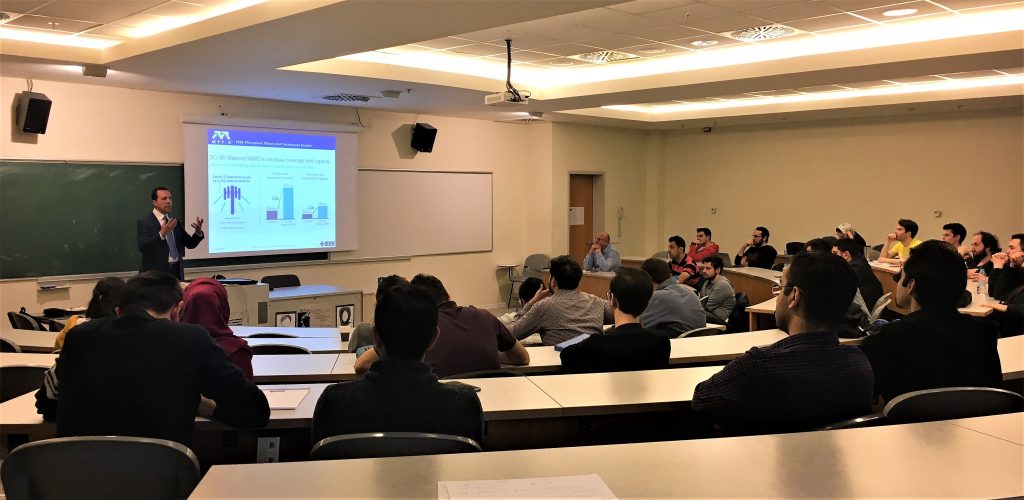
vTools Link: https://events.vtools.ieee.org/m/197371
—
22 March 2019: IEEE-MTT Distinguished Lecturer Seminar by Dr. Markus Gardill
Topic: “Automotive Radar – A Signal Processing Perspective on Current Technology and Future Systems”
Location: Middle East Technical University, Ankara, Turkey
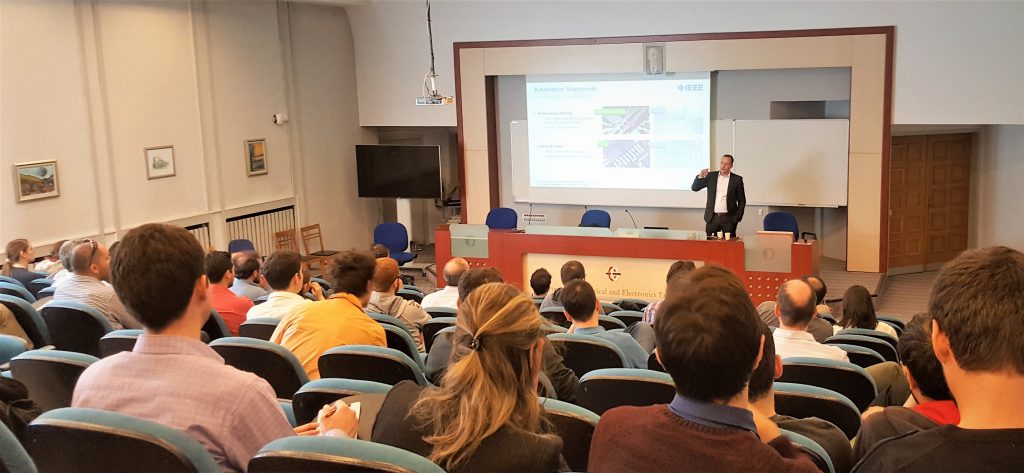
vTools Link: https://events.vtools.ieee.org/m/196426
—
15 March 2019 (13:00): IEEE AP/MTT/EMC/ED Turkey Seminar Series (S.46)
Speaker: Assoc. Prof. Selim Aksoy, Bilkent University
Topic: “Weakly Supervised Learning Algorithms for Medical Imaging and Remote Sensing Applications”
Location: Middle East Technical University, Ankara, Turkey
Abstract: Learning classifiers from large image sets has been a popular problem in computer vision and machine learning. The commonly employed supervised learning framework typically uses manually selected image patches with no ambiguity regarding their class labels. However, collecting sufficiently large number of examples for classes with high within-class variance and low between-class variance is not always possible. We will present weakly supervised learning algorithms for object recognition and image classification tasks in medical imaging and remote sensing applications with data sets having both localization and labeling uncertainties.
Bio: Dr. Selim Aksoy received the B.S. degree from Middle East Technical University in 1996, and the M.S. and Ph.D. degrees from the University of Washington, Seattle, USA, in 1998 and 2001, respectively. Since 2004, he has been with the Department of Computer Engineering, Bilkent University, where he is currently an Associate Professor. He spent 2013 as a Visiting Associate Professor at the Department of Computer Science & Engineering, University of Washington. His research interests include computer vision, pattern recognition, and machine learning with applications to remote sensing and medical imaging. He received the Research Incentive Award from the Prof. Dr. Mustafa Parlar Foundation in 2016, the BAGEP Young Scientist Award from the Science Academy Association in 2016, the GEBIP Outstanding Young Scientist Award from the Turkish Academy of Sciences in 2015, the Distinguished Teaching Award from Bilkent University in 2014, a Fulbright Scholarship in 2013, a Marie Curie Fellowship from the European Commission in 2005, and the CAREER Award from the Scientific and Technological Research Council of Turkey (TUBITAK) in 2004. He served as an Associate Editor of Pattern Recognition Letters during 2009-2013.
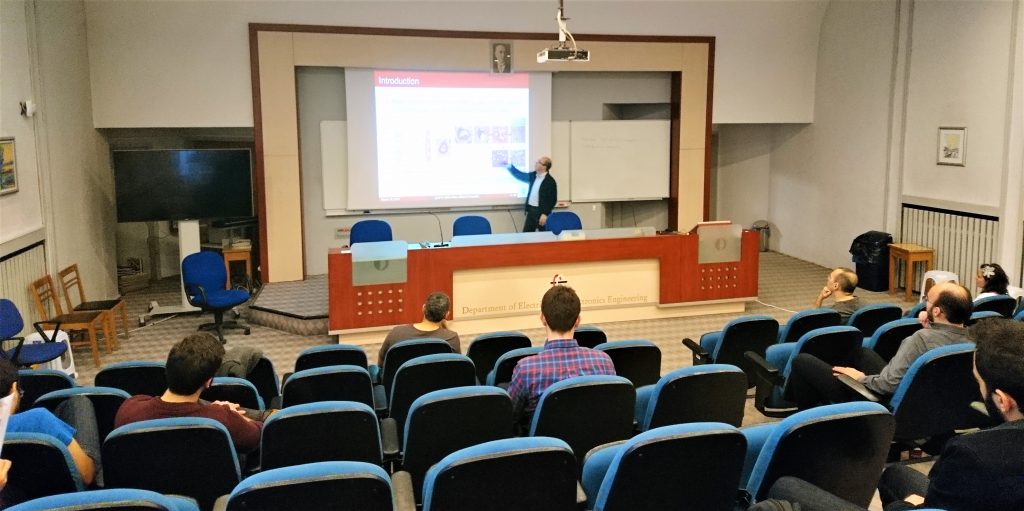
vTools Link: https://events.vtools.ieee.org/m/196423
—
08 March 2019 (13:40): IEEE AP/MTT/EMC/ED Turkey Seminar Series (S.45)
Speaker: Assoc. Prof. Tolga Çukur, Bilkent University
Topic: “Rapid, Comprehensive, High-Resolution MR Imaging: From Sparse Recovery to Machine Learning”
Location: Middle East Technical University, Ankara, Turkey
Abstract: MRI offers an unprecedented opportunity to noninvasively examine the morphology and function of the human body in vivo. Yet, the quest for higher diagnostic utility by increasing image quality and diversity is often countered by limitations due to experimental and economic concerns. This talk will convey an overview of research at ICON Lab at Bilkent University towards addressing fundamental limitations to enable favorable trade-offs among imaging parameters. Technological innovations include high-resolution targeted pulse sequences, compressive sensing algorithms, as well as deep learning and other machine learning techniques for image processing and statistical modeling. These strategies can achieve substantial improvements in image quality for both structural and functional MRI. Challenging applications that involve the inverse problems of image reconstruction and image synthesis will be showcased.
Bio: Dr. Çukur received his B.S. degree from Bilkent University in 2003, and his Ph.D. degree from Stanford University in 2009, both in Electrical Engineering. He was a postdoctoral fellow at Helen Wills Neuroscience Institute at University of California, Berkeley till 2013. Currently, he is an Associate Professor in the Department of Electrical and Electronics Engineering, UMRAM, and Neuroscience Program at Bilkent University. His lab develops computational imaging methods for understanding the anatomy and function of biological systems in normal and disease states. He is the recipient of TUBITAK Career Award (2015), TUBA-GEBIP Outstanding Young Scientist Award (2015), BAGEP Young Scientist Award (2017), IEEE Turkey Research Encouragement Award (2017), Science Heroes Association Young Scientist of the Year Award (2018), and he is a senior member of IEEE (2017).
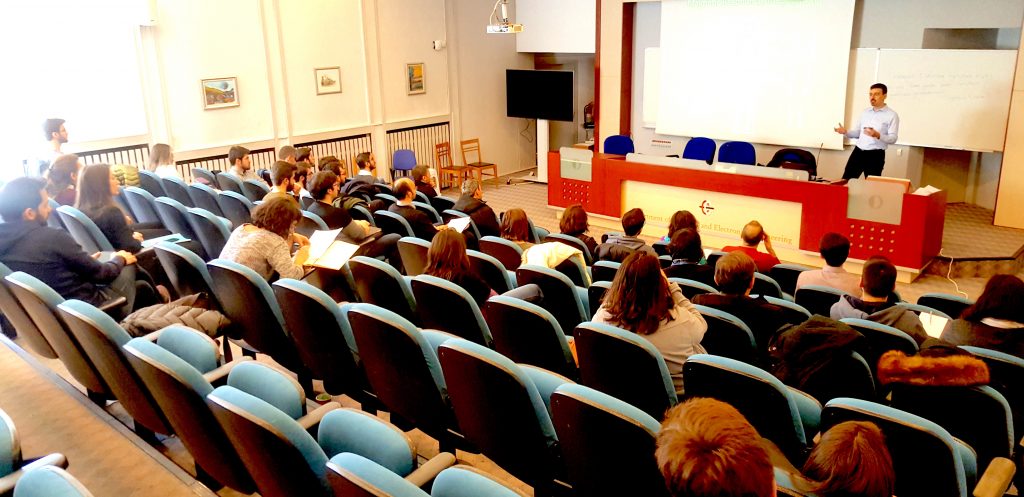
vTools Link: https://events.vtools.ieee.org/m/194920
—
01 March 2019 (13:40): IEEE AP/MTT/EMC/ED Turkey Seminar Series (S.44)
Speaker: Asst. Prof. Emre Akbaş, Middle East Technical University
Topic: “Object Detection Through Search with a Foveated Visual System”
Location: Middle East Technical University, Ankara, Turkey
Abstract: In this talk, I will present a foveated object detector (FOD) as a biologically-inspired alternative to the sliding window (SW) approach which is the dominant method of search in computer vision object detection. Similar to the human visual system, the FOD has higher resolution at the fovea and lower resolution at the visual periphery. Consequently, more computational resources are allocated at the fovea and relatively fewer at the periphery. The FOD processes the entire scene, uses retino-specific object detection classifiers to guide eye movements, aligns its fovea with regions of interest in the input image and integrates observations across multiple fixations. Our approach combines object detectors from computer vision with a recent model of peripheral pooling regions found at the V1 layer of the human visual system. We assessed various eye movement strategies on the PASCAL VOC 2007 dataset and show that the FOD performs on par with the SW detector while bringing significant computational cost savings.
Bio: Dr. Emre Akbas is an assistant professor at the Department of Computer Engineering, Middle East Technical University (METU). Prior to joining METU, he was a postdoctoral research associate at the Department of Psychological and Brain Sciences, University of California Santa Barbara. He received his PhD degree from the Department of Electrical and Computer Engineering, University of Illinois at Urbana-Champaign in 2011. His BS and MS degrees are from the Department of Computer Engineering, METU.
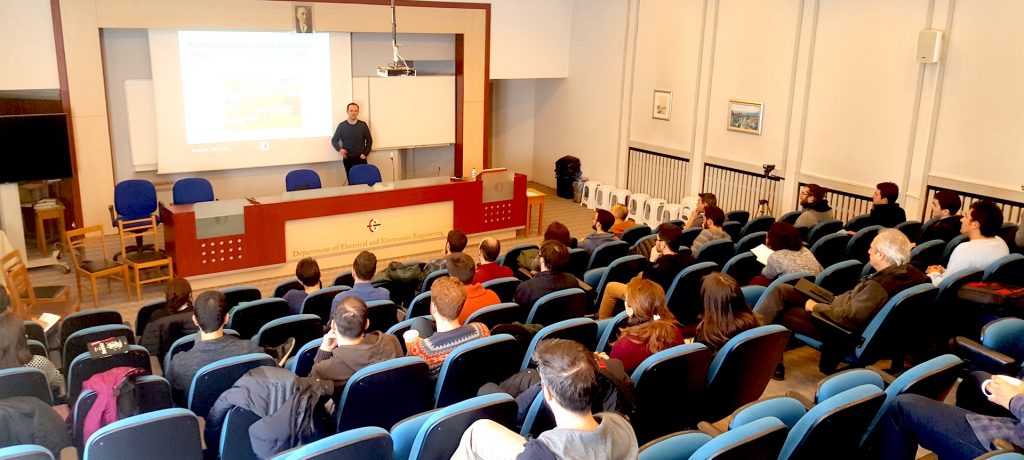
vTools Link: https://events.vtools.ieee.org/m/194919
—
15 February 2019: IEEE-APS Distinguished Lecturer Seminar by Prof. Ari Sihvola
Topic: “Metamaterials in electromagnetics: A bird’s-eye view”
Location: Middle East Technical University, Ankara, Turkey
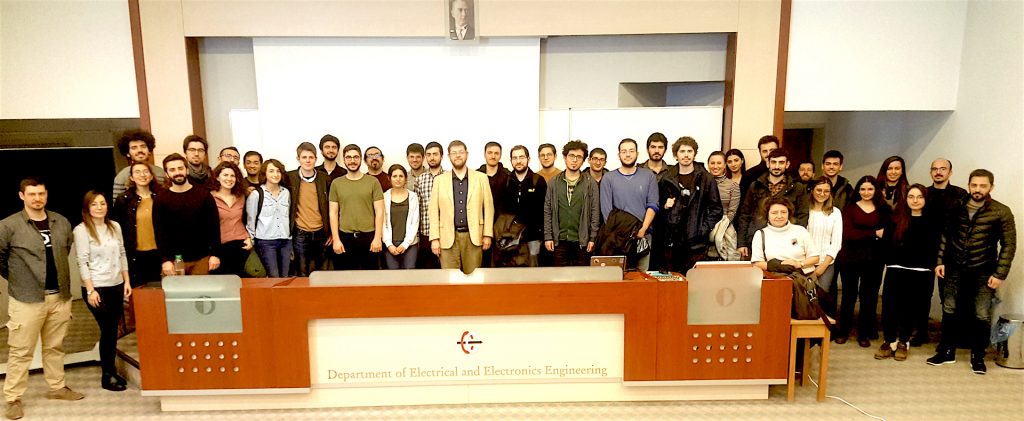
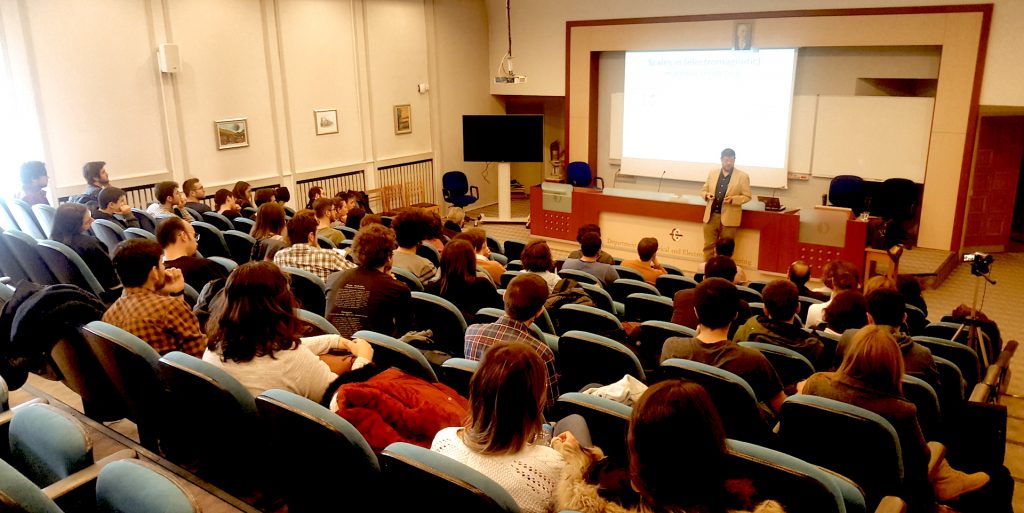
vTools Link: https://events.vtools.ieee.org/m/194917
—
12 February 2019: IEEE-APS Distinguished Lecturer Seminar by Prof. Ari Sihvola
Topic: “Characterization and effective description of heterogeneous and composite electromagnetic materials”
Location: Gebze Technical University, Gebze, Turkey
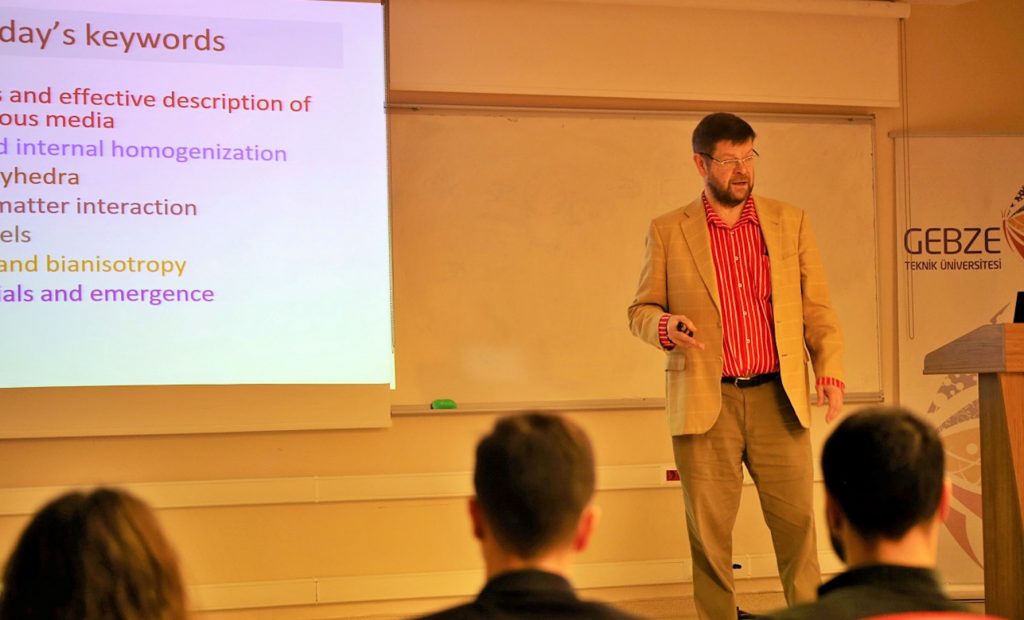
vTools Link: https://events.vtools.ieee.org/m/194916
